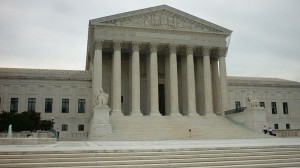 Greece, New York — The United States Supreme Court has agreed to take up a case that could set a new precedent surrounding prayers at town hall meetings.
Greece, New York — The United States Supreme Court has agreed to take up a case that could set a new precedent surrounding prayers at town hall meetings.
The Court accepted the case of Town of Greece v. Galloway on Monday, a legal challenge that centers on the invocations that are offered at town hall meetings in Greece, New York, just outside of Rochester.
The matter stems back to 2010, when local residents Susan Galloway and Linda Stephens sued the town, asserting that its predominantly Christian prayers violate the Constitution. Represented by the American Civil Liberties Union (ACLU), the women noted that most of the invocations were in Jesus’ name or referenced the Holy Spirit. Galloway and Stephens contended that the prayers made them feel “marginalized” as they are not followers of the Christian faith. Galloway is Jewish and Stephens is an atheist.
After some residents first complained to town officials about the matter, other faiths were incorporated into the meetings, including at one point, the Wiccan religion. However, as prayers continued to be in Jesus’ name more often than not since the town is largely comprised of Christian and Catholic churches, the women decided to take the matter to court.
After a New York district court sided with the town, last year, the Second Circuit Court of Appeals overturned the ruling. It declared that the invocations delivered at the town hall meetings violated the Constitution’s Establishment Clause, which states that “Congress shall make no law respecting an establishment of religion.” The court did not take issue with the practice of praying before the meetings per se, but rather contended that the invocations needed to be more diverse.
“[The prayers] virtually ensured a Christian viewpoint,” the justices opined.
Greece officials then appealed the ruling to the United States Supreme Court, requesting intervention in the matter.
“A town council meeting isn’t a church service, and it shouldn’t seem like one,” commented Barry Lynn, the executive director of Americans United for Separation of Church and State (AUSCS). “Government can’t serve everyone in the community when it endorses one faith over others. That sends the clear message that some are second-class citizens based on what they believe about religion.”
However, Alliance Defending Freedom (ADF), which is representing the town, says that prayer at government meetings is a long-held tradition that was observed even by the Founding Fathers.
“Americans today should be as free as the Founders were to pray,” stated ADF senior counsel David Cortman. “The Founders prayed while drafting our Constitution’s Bill of Rights, and the Supreme Court has ruled that public prayer is part of the ‘history and tradition of this country.’ America continues this cherished practice.”
Pastor Vince DiPaola of Lakeshore Community Church agreed. He told the Rochester Democrat and Chronicle that he took issue with the statement of one of the original complainants, Nancy Braiman, who said that she hopes the Supreme Court “settles this once and for all and says it’s best to leave such prayers out of government proceedings.”
“[T]hat’s what these fringe groups interpret that it should be,“ he said. “It‘s just that in our culture, a minority of people seem to have the ultimate goal of telling people that you have to keep your faith locked away between your ears. They want you to shut up and intimidate you.”
Become a Christian News Network Supporter...


